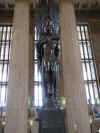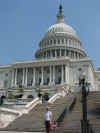![]()
Home Again, Home Again...Jiggety Jig
Our homeward trip began with a short commuter hop from Exton, Pennsylvania to Philadelphia, where we changed trains to Amtrak's Regional Service to Washington, D.C. For West Coasters, Amtrak's corridor service is very crisp - these trains run on Amtrak owned and operated track, are not subject to freight train interference, and the equipment is capable of operating at speeds of 125MPH (Regional) or 160MPH (Acela). Compared to a leisurely ride on the Cascades Talgo at 70MPH or so, it's positively exciting to watch the corridor scenery scream past at 125MPH. There's a real "wow factor" when two high speed trains pass each other, with an approach velocity of 250MPH or more.
The East Coast communities, and some of the Chicago suburbs, grew up around the railroad tracks. What makes high speed rail possible there is the absence of grade crossings (where roads cross the tracks). For nearly all of the route, the locomotive horn is silent. Without grade crossings, there are few technical obstacles to operating trains at 120MPH or more. Compare that to a trip from Portland to Seattle on the Talgo, where you encounter a more or less continuous string of grade crossings and the locomotive horn is blowing constantly. To retrofit a high-speed rail corridor between Portland and Seattle would require astronomical capital investment to remove the grade crossings with overpasses, flyovers, or underpasses. But it is interesting to compare that rail investment to future freeway infrastructure improvements that will be required to keep up with increased Interstate 5 traffic, especially when the energy, environmental, and safety advantages of rail are thrown into the mix.
We had about three hours in Washington to grab lunch, and take a quick walk down to the Capitol and Mall areas. It was HOT there, and we were glad to get back to the air conditioned comfort of Union Station. Our train into Chicago was about four hours late, so we didn't have time to walk down to the lake, but we have plenty of time to make our connection. We'll be boarding the Empire Builder for home momentarily.
















